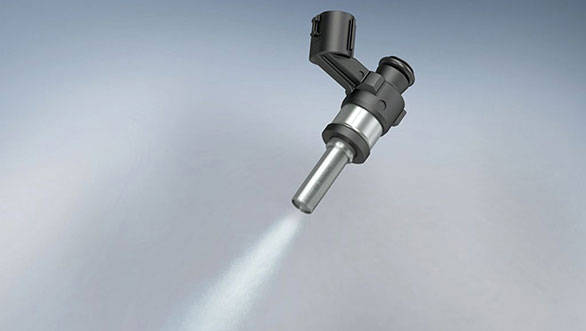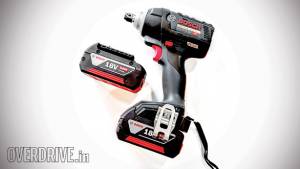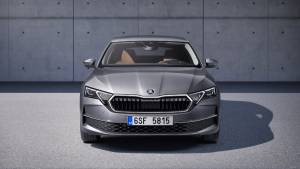Bosch to offer new fuel injection system that may price-match carburetors in India
Bosch has come up with a new fuel injection system for OEM applications. The big deal is that this system finally bridges the cost difference between carburettors - traditionally cheaper - and fuel injection - traditionally more expensive though more precise. The price difference between carburettors and fuel injection systems has been one of the biggest reasons why only the larger displacement, and hence higher priced, motorcycles in India today offer the latter despite the tight emissions norms. Adding the precision and control of a fuel injection system has many benefits including easier serviceability, tighter control over economy and less sensitivity to changes in temperature and altitude.

Bosch will also offer the facility to connect this system to smart phones. The company says the connection could be used to keep the user informed about the fuel economy and trip information. This sounds like an empty promise because there are already other systems that supply accurate enough trip and economy data. The real utility of the smartphone connection is to be able to physically turn off the fuel injection system making it a proper theft deterrent.
Bosch says it intends to bring these low-cost systems to Asia, especially India and south-east Asia - high volume price sensitive markets. Dr Rolf Bulander, member of Bosch GmbH board said, "In Asia, it is this smart-phone connectivity that â" perhaps even more than emissions regulations â" provides the impetus for our electronic fuel injection systems." Bosch says that this advancement will improve engine performance while reducing CO2 and fuel emissions.
 Bosch intends to bring these low-cost systems to Asia, especially India and south-east Asia - high volume price sensitive markets
Bosch intends to bring these low-cost systems to Asia, especially India and south-east Asia - high volume price sensitive markets
Bosch has been focussing on the Indian and South-East Asian markets and recently also introduced the single-channel ABS system for OEM applications. This too is a low cost system that allows ABS to become accessible to lower priced motorcycles.
Bosch offers new fuel injection systems that price-match carburettors
| Bosch is entering the global market for two-wheeler powertrains with its own range of complete systems. The company has developed an electronically controlled fuel injection system that can be adapted to any vehicle â" allowing Bosch to offer solutions ranging from the cheapest single-cylinder two-wheeler in Asia to the high-performance bikes prevalent in Europe and North America. "Bosch is known for the quality and efficiency of its automotive powertrain technology, and now we want to bring that same success to the two-wheeler," says Dr. Rolf Bulander, whose responsibilities as a member of the Robert Bosch GmbH board of management include powertrain technology. For decades, Bosch automotive powertrain technology has brought together efficiency, comfort, and driving enjoyment. But until now, the company's presence in the two-wheeler segment has revolved chiefly around automotive components modified for use in high-performance motorcycles. Now motorcyclists will be able to see for themselves the benefits of Bosch's perfectly matching systems solutions in areas such as fuel consumption, reduction of CO2 emissions, and engine performance. Bosch also intends to apply its unified systems approach to low-cost models in Asia. Especially in India and southeast Asia, the two-wheeler market is experiencing double-digit annual growth. What is more, the popularity of carburetor technology seems to be waning in Asia as elsewhere. As Bulander says: "No new car has a carburetor anymore â" and soon that will be true of the two-wheeler as well." In developing markets, Bosch is pinning its hopes on its electronically controlled injection systems, which are considerably more efficient. In technical terms, they are comparable with the port fuel injection systems for cars that Bosch produces in the millions. Thanks to innovative developments and modifications, Bosch is in a position to offer its electronically controlled solution for single-cylinder engines at about the same price as a standard carburetor version. A compact engine control unit and injection valve with additional functions help keep the cost low. Bosch can achieve further cost benefits by drawing on its extensive experience and expertise in combustion processes and engine dynamics, which allow it to develop functions and software in such a way as to eliminate the need for sensors. Bosch is connecting two-wheelers with smartphones The Bosch electronic fuel injection system also opens up a variety of opportunities for two-wheeler connectivity functions. For instance, riders can call up information about average fuel consumption or journey details on their smartphone. Smartphones can also be used to activate immobilizers by sending a signal to shut off the fuel supply. "In Asia, it is this smartphone connectivity that â" perhaps even more than emissions regulations â" provides the impetus for our electronic fuel injection systems," says Bulander. In China, meanwhile, Bosch is focusing on zero-emission mobility with a range of electrically driven eScooters. The market for these electrically driven two-wheelers is expected to show particularly strong growth in China. Aside from powertrain technology, Bosch has been offering a comprehensive range of motorcycle safety solutions for many years now. One of these is an affordable single-channel ABS system that improves the brake performance of low-cost two-wheelers. At the other end of the scale, there is the world-exclusive Bosch motorcycle stability control system â" a sort of ESP for motorcycles. Bosch regards the two-wheeler segment as one of the growth markets of the future and expects worldwide sales of motorcycles to reach around 150 million units in 2020, more than the equivalent figure for cars. Just as it is for cars, Asia is a driver of growth in the two-wheeler segment. | |














